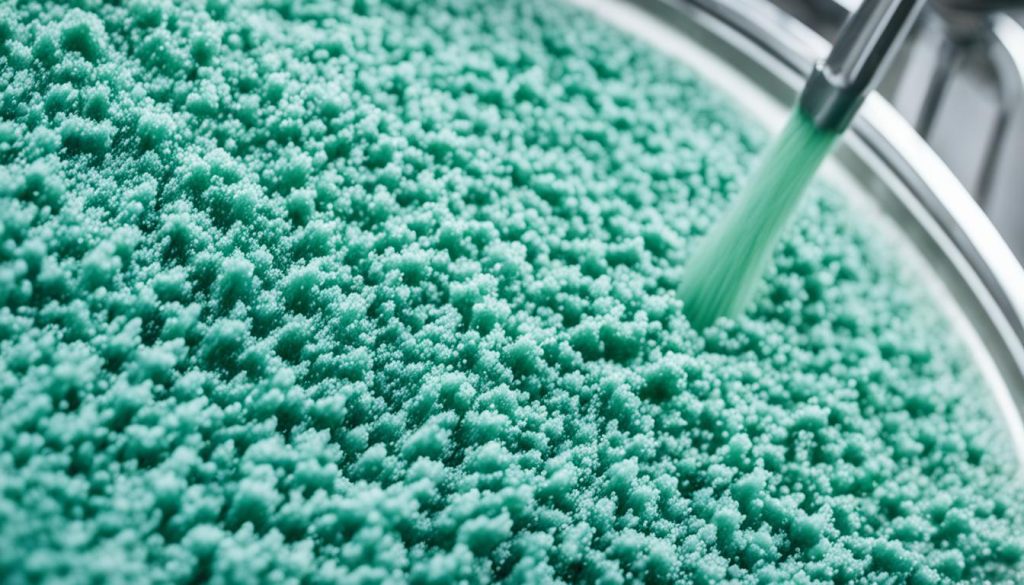Kitchen extractor fans are a vital component of any modern kitchen. They effectively remove smells and fumes while cooking, ensuring a fresh and pleasant environment. However, over time, the fan filters can become clogged with grease and grime, compromising their efficiency and potentially leading to unpleasant odors and even fire hazards. Regular maintenance and cleaning of your extractor filters are crucial for maintaining the performance and longevity of your kitchen extractor fan.
In this easy guide, we will provide step-by-step instructions on how to clean extractor filters, ensuring a cleaner and safer kitchen environment. By following these simple cleaning techniques, you can enjoy the benefits of a properly functioning extractor fan and eliminate the risks associated with dirty filters.
Now, let’s delve into the details of extractor filter cleaning methods and kitchen extractor fan maintenance to keep your kitchen fresh and enjoyable for cooking.
How to Clean Extractor Filters?
Extractor fan filters play a crucial role in maintaining a clean and healthy kitchen environment. These fine mesh grates are located on the underside of the hood and are responsible for capturing grease and fumes, preventing them from reaching the extraction vents. It is essential to regularly clean and maintain these filters to ensure the optimal performance of your extractor fan.
Dirty extractor filters can lead to a range of complications, including fire hazards, unpleasant smells, and reduced efficiency of the fan. Over time, grease and grime accumulate on the filters, obstructing airflow and decreasing their overall effectiveness. Proper care and cleaning of extractor hood filters are necessary to prevent these issues and create a safe and functional kitchen space.
“Maintaining clean and functional extractor fan filters is essential for a safe and efficient kitchen.”
Cleaning the extractor fan filters not only improves the efficiency of the fan but also eliminates unpleasant odours and reduces the risk of potential fire hazards. By investing a little time in regular maintenance, you can keep your kitchen fresh and enjoyable for cooking.
Tips for Extractor Hood Filter Care
To ensure the longevity and effectiveness of your extractor fan filters, you should follow these maintenance tips:
- Regular Cleaning: Clean the filters at least once every 2-3 months, depending on your cooking frequency. This helps prevent grease build-up and maintains optimum airflow.
- Use Gentle Cleaning Methods: Avoid using harsh chemicals or abrasive materials when cleaning. Instead, opt for mild dishwashing soap and warm water. This will preserve the integrity of the filters and prevent any damage.
- Thoroughly Dry Before Reinstallation: After cleaning the filters, ensure they are completely dry before reattaching them to the hood. Moisture can promote the growth of bacteria and mould, leading to foul odours and potential health risks.
- Inspect Regularly: Take the time to inspect the filters for any signs of damage or wear. If the filters appear damaged or do not fit securely, replace them immediately to maintain optimal performance and safety.
By following these tips, you can effectively care for your extractor hood filters and enjoy a clean and efficient kitchen ventilation system.
Extractor Filter Cleaning Methods
When it comes to cleaning extractor fan filters, there are several methods you can choose from. Below are two commonly used techniques:
- Hand Washing: This method involves manually cleaning the filters using warm water, mild dishwashing soap, and a non-abrasive brush. Immerse the filters in the soapy water, scrub away any grease or grime, and rinse thoroughly before drying.
- Dishwasher Cleaning: Some extractor fan filters are dishwasher safe. Check the manufacturer’s instructions to determine if your filters can be safely placed in the dishwasher. If they are, simply remove the filters and place them in the dishwasher along with your regular dishwasher load.
Remember to check the manufacturer’s guidelines before using any cleaning method to ensure that you do not damage or void the warranty of your extractor fan or filters.

Extractor Filter Maintenance Tips
In addition to regular cleaning, here are a few maintenance tips to keep your extractor fan filters in optimal condition:
- Regular Inspection: Take the time to inspect the filters for any signs of damage, wear, or excessive grease build-up. Address any issues promptly to prevent further complications.
- Preventive Measures: Use a splatter guard while cooking to minimize grease and debris from reaching the filters. Wiping down the filters after each cooking session can also help prevent excessive build-up.
By implementing these tips, you can ensure the longevity and efficiency of your extractor fan filters, creating a safe and pleasant kitchen environment for cooking and entertaining.
How to Clean Extractor Fan Filters?
Cleaning extractor fan filters is a simple process that can be done using basic household items. Follow these easy steps to keep your extractor hood filters clean and efficient:
- Carefully remove the filters from the hood.
- Fill a sink or bucket with hot water and add dishwashing soap and baking soda. This solution helps to break down the grease and grime.
- Submerge the filters in the soapy water and let them soak for 10 minutes. This will loosen any accumulated dirt and make the cleaning process easier.
- Using a non-abrasive brush, scrub the filters gently to remove grease and grime. Pay attention to both sides of the filters to ensure a thorough clean.
- Rinse the filters thoroughly with hot water to remove any residue. Make sure to remove all soap and cleaning solution.
- Dry the filters with paper towels or a clean cloth to prevent the growth of mold or mildew.
- Reinstall the clean filters back into the hood.
To maintain optimal performance, it is recommended to deep-clean the extractor fan filters every 1-2 months. Regular cleaning will help prevent grease build-up and ensure that your extractor fan functions effectively.
Preventing Grease Build Up on Fan Filters
To prevent grease build-up on extractor fan filters, there are a few maintenance tips and cleaning hacks you can employ:
- After each use of the hob, wipe the filters with a cloth or paper towel. This quick wipe-down will help remove any immediate grease or residue.
- Before cleaning the fan and hood, ensure they are completely cooled. This safety precaution not only prevents accidental burns but also allows for easier cleaning.
- Regularly clean the filters between deep cleans. This can help reduce grease clogging and maintain the efficiency of the extractor fan.
- If frying is a common cause of grime, consider using a splatter guard while cooking. This additional layer of protection can minimize grease accumulation on the filters.
By implementing these preventive measures, you can make the deep cleaning process easier and ensure the efficient functioning of your extractor fan.
Remember, regular maintenance is key to keeping your kitchen fresh and your extractor fan in optimal condition.

Best Practices for Extractor Filter Maintenance:
| Tip | Description |
|---|---|
| Wipe After Each Use | Use a cloth or paper towel to wipe off any grease or residue from the filters after each use of the hob. |
| Cool Before Cleaning | Ensure the fan and hood are completely cooled down before attempting to clean them. |
| Regular Cleaning | In addition to deep cleaning, regularly clean the filters to prevent grease clogging and maintain efficiency. |
| Use a Splatter Guard | If frying is a common cooking method, consider using a splatter guard to minimize grease build-up on the filters. |
Conclusion
Regular cleaning and maintenance of your extractor fan filters are crucial for creating a fresh and safe kitchen environment. By following the easy guide provided in this article, you can effectively keep your filters free from grease and grime, preventing potential hazards and ensuring the optimal performance of your extractor fan.
Remember to deep-clean the filters every 1-2 months to maintain their efficiency. In addition to regular cleaning, implementing preventive measures such as wiping the filters after each use and using splatter guards can further reduce grease build-up and prolong the lifespan of your filters.
With clean and well-maintained extractor fan filters, you can enjoy a fresh and enjoyable cooking experience while keeping your kitchen air clean and odor-free. Take pride in your hard work and commitment to maintaining a healthy kitchen environment.
FAQ
What are extractor fan filters and why clean them?
Extractor fan filters are the mesh grates located on the underside of the hood that prevent grease and fumes from reaching the extraction vents. Cleaning them is important to maintain the fan’s efficiency and prevent fire hazards and unpleasant smells.
How often should I clean extractor fan filters?
It is recommended to deep-clean the filters every 1-2 months for optimal performance.
What is the best way to clean extractor filters?
Fill a sink or bucket with hot water, dishwashing soap, and baking soda. Submerge the filters and let them soak for 10 minutes. Scrub with a non-abrasive brush, rinse thoroughly, and dry before reinstalling.
How can I prevent grease build-up on extractor fan filters?
Wipe the filters with a cloth or paper towel after each use of the hob. Regular cleaning between deep cleans and using a splatter guard while frying can also minimize grease build-up.
How can I maintain the efficiency of my extractor fan?
Cleaning the filters regularly and following preventive measures to prevent grease build-up will help maintain the efficiency of your extractor fan.







